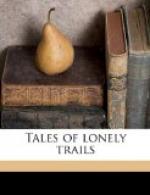Next in order was the sorrel. As I saw it, he heedlessly went too near the cow, which we now called Bossy, and she acted somewhat like a Spanish Bull, to the effect that the sorrel was scared and angered at once. He began to run and plunge and buck right into the other pack animals, dropping articles from his pack as he dashed along. He stampeded the train, and gave the saddle horses a scare. When order was restored and the whole outfit gathered together again a full hour had been lost. By this time all the horses were tired, and that facilitated progress, because there were no more serious breaks.
Down in the valley it was hot, and the ride grew long and wearisome. Nevertheless, the scenery was beautiful. The valley was green and level, and a meandering stream formed many little lakes. On one side was a steep hill of sage and aspens, and on the other a black, spear-pointed spruce forest, rising sheer to a bold, blunt peak patched with snow-banks, and bronze and gray in the clear light. Huge white clouds sailed aloft, making dark moving shadows along the great slopes.
We reached our turning-off place about five o’clock, and again entered the fragrant, quiet forest—a welcome change. We climbed and climbed, at length coming into an open park of slopes and green borders of forest, with a lake in the center. We pitched camp on the skirt of the western slope, under the spruces, and worked hard to get the tents up and boughs cut for beds. Darkness caught us with our hands still full, and we ate supper in the light of a camp-fire, with the black, deep forest behind, and the pale afterglow across the lake.
I had a bad night, being too tired to sleep well. Many times I saw the moon shadows of spruce branches trembling on the tent walls, and the flickering shadows of the dying camp-fire. I heard the melodious tinkle of the bells on the hobbled horses. Bossy bawled often—a discordant break in the serenity of the night. Occasionally the hounds bayed her.




